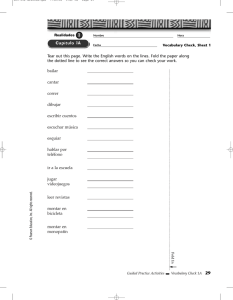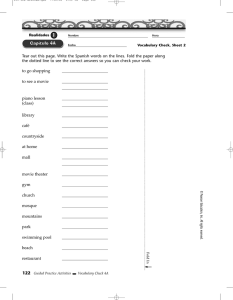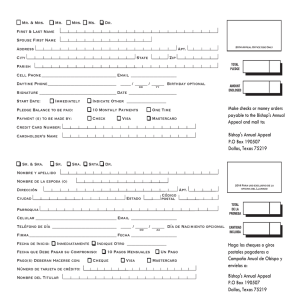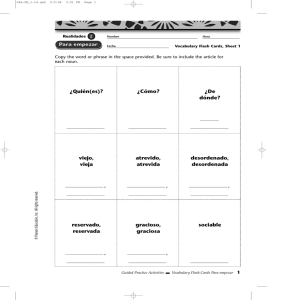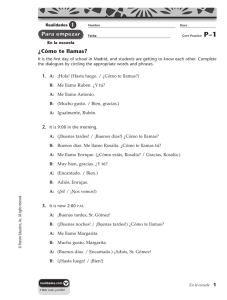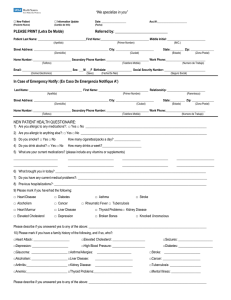Write the Spanish vocabulary word or phrase below each picture. Be
Anuncio
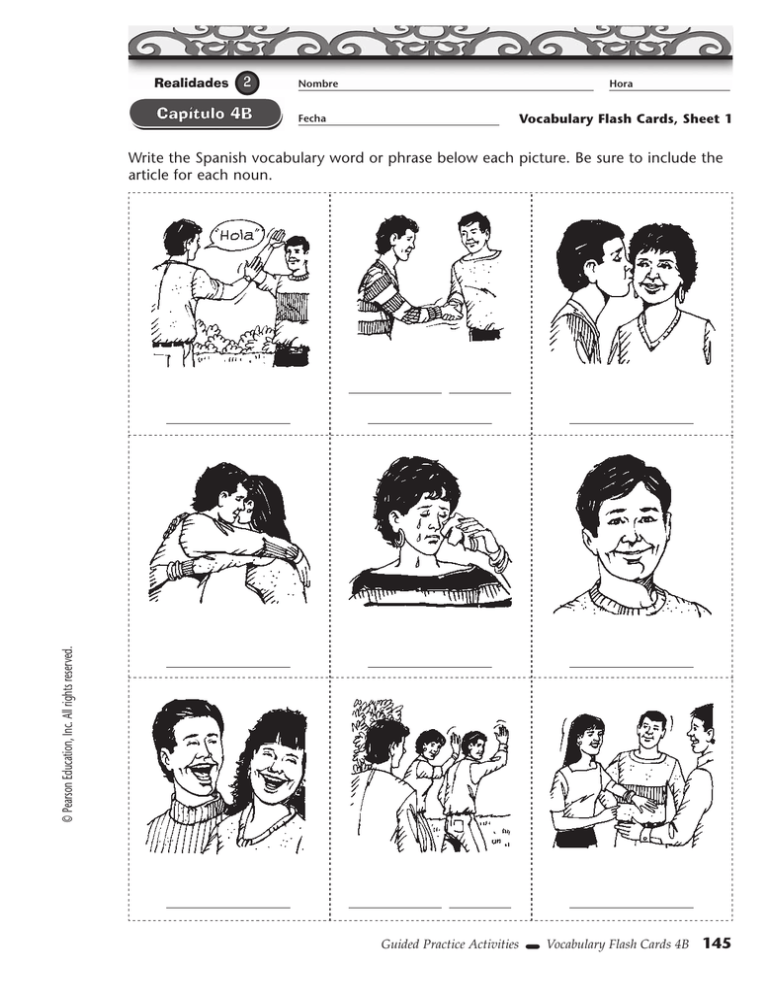
Realidades Nombre Fecha Hora Vocabulary Flash Cards, Sheet 1 © Pearson Education, Inc. All rights reserved. Write the Spanish vocabulary word or phrase below each picture. Be sure to include the article for each noun. Guided Practice Activities Vocabulary Flash Cards 4B 145 Realidades Nombre Hora Vocabulary Flash Cards, Sheet 2 Fecha Write the Spanish vocabulary word or phrase below each picture. Be sure to include the article for each noun. © Pearson Education, Inc. All rights reserved. 146 Guided Practice Activities Vocabulary Flash Cards 4B Realidades Nombre Hora Vocabulary Flash Cards, Sheet 3 Fecha Write the Spanish vocabulary word below each picture. If there is a word or phrase, copy it in the space provided. Be sure to include the article for each noun. llevarse bien, llevarse mal felicitar los parientes la costumbre divertirse © Pearson Education, Inc. All rights reserved. , alrededor de Guided Practice Activities Vocabulary Flash Cards 4B 147 Realidades Nombre Hora Vocabulary Flash Cards, Sheet 4 Fecha Copy the word or phrase in the space provided. Be sure to include the article for each noun. nacer la reunión antiguo, antigua , había mientras (que) recordar el día festivo ¡Felicidades! 148 Guided Practice Activities Vocabulary Flash Cards 4B © Pearson Education, Inc. All rights reserved. frecuentemente Realidades Nombre Hora Vocabulary Check, Sheet 1 Fecha Tear out this page. Write the English words on the lines. Fold the paper along the dotted line to see the correct answers so you can check your work. el bebé, la bebé el aniversario la costumbre el desfile el día festivo la fiesta de sorpresa los fuegos artificiales la reunión los mayores los modales © Pearson Education, Inc. All rights reserved. abrazar(se) besar(se) dar(se) la mano Fold In Guided Practice Activities Vocabulary Check 4B 149 Realidades Nombre Hora Vocabulary Check, Sheet 2 Fecha Tear out this page. Write the Spanish words on the lines. Fold the paper along the dotted line to see the correct answers so you can check your work. baby anniversary custom parade holiday surprise party fireworks gathering grown-ups manners to hug © Pearson Education, Inc. All rights reserved. to kiss to shake hands Fold In 150 Guided Practice Activities Vocabulary Check 4B Realidades Nombre Hora Vocabulary Check, Sheet 3 Fecha Tear out this page. Write the English words on the lines. Fold the paper along the dotted line to see the correct answers so you can check your work. despedirse (de) saludar(se) sonreír contar (chistes) llorar reírse reunirse casarse (con) charlar cumplir años hacer un picnic © Pearson Education, Inc. All rights reserved. nacer regalar recordar Fold In Guided Practice Activities Vocabulary Check 4B 151 Realidades Nombre Hora Vocabulary Check, Sheet 4 Fecha Tear out this page. Write the Spanish words on the lines. Fold the paper along the dotted line to see the correct answers so you can check your work. to say goodbye (to) to greet to smile to tell (jokes) to cry to laugh to meet to get married (to) to chat to have a birthday to have a picnic to be born © Pearson Education, Inc. All rights reserved. to give (a gift) to remember 152 Guided Practice Activities Vocabulary Check 4B Fold In To hear a complete list of the vocabulary for this chapter, go to www.realidades.com and type in the Web Code jdd-0499. Then click on Repaso del capítulo. Realidades Nombre Hora Fecha Guided Practice Activities 4B-1 The imperfect tense: describing a situation (p. 219) • The imperfect tense is also used to describe people, places, and situations in the past: La casa de mis abuelos era pequeña. Tenía dos dormitorios. My grandparents’ house was small. It had two bedrooms. Mi abuelo era muy generoso. My grandfather was very generous. Las fiestas en la casa de mis abuelos eran muy divertidas. The parties at my grandparents’ house were a lot of fun. A. Read the following paragraph and draw a line underneath all the verbs used to describe the situation. The first one has been done for you. Cuando era niño, mi familia y yo siempre íbamos al lago. Mis abuelos tenían una casa de verano que estaba cerca del lago. El lago era muy grande y bonito. Había árboles alrededor del lago. Generalmente hacía mucho calor y por eso nos gustaba nadar en el lago porque era más fresco (cool). B. Read the following sentences about the paragraph in exercise A. Write cierto if they are true or falso if they are false. The first one is done for you. 1. La familia siempre iba al océano durante el verano. falso © Pearson Education, Inc. All rights reserved. 2. Los tíos tenían una casa de verano cerca del lago. 3. Era un lago grande con árboles alrededor. 4. Hacía mucho calor en el verano. 5. No podían nadar en el lago. i\Xc`[X[\j%Zfd • Web Code: jdd-0413 Guided Practice Activities 4B-1 153 Realidades Nombre Fecha Hora Guided Practice Activities 4B-1a The imperfect tense (continued ) C. Complete the following sentences by writing the correct form of the verbs in parentheses using the imperfect tense. Use the the pictures to help you with the meaning of the sentences. Follow the model. Modelo El tío Pepe (contar) contaba chistes. 1. Nosotros (charlar) con los parientes. 2. Mis padres (hacer) picnics. 3. Yo (pasar) Mis hermanos (jugar) 5. Andréa (tener) 6. Tú (divertirse) 154 Guided Practice Activities 4B-1a © Pearson Education, Inc. All rights reserved. 4. tiempo con mis amigos. al fútbol. buenos modales. en las fiestas. i\Xc`[X[\j%Zfd • Web Code: jdd-0413 Realidades Nombre Hora Fecha Guided Practice Activities 4B-2 The imperfect tense (continued) • The imperfect is also used to talk about a past action or situation when no beginning or ending time is mentioned. Había mucha gente en la fiesta para el aniversario de mis padres. There were many people at the party for my parents’ anniversary. © Pearson Education, Inc. All rights reserved. D. Look at the scene to start thinking about what is happening. Then, read the paragraph below it and fill in the missing form of the verbs in parentheses that describe the situation in the past. The first one is done for you. Cuando yo era (ser) niña, mis parientes (reunirse) (preparar) mucha los domingos en casa de mi abuela. Mi abuela comida y mi madre y mis tías la (ayudar). Yo (jugar) con mis primos. Todos nosotros (llevarse) muy bien, y Nosotros (divertirse) mucho. (almorzar) juntos (together) y (reírse) mucho contando chistes todo el tiempo. i\Xc`[X[\j%Zfd • Web Code: jdd-0413 Guided Practice Activities 4B-2 155 Realidades Nombre Fecha Hora Guided Practice Activities 4B-3 The imperfect tense (continued) • The imperfect tense is also used to tell what someone was doing when something else happened (preterite): Mis parientes charlaban cuando mi mamá entró. My relatives were chatting when my mother came in. E. Read the sentences below about a party. Circle the action that was taking place in the description. Then, underline the action that stopped it. The first one is done for you. 1. Yo hablaba por teléfono cuando la fiesta empezó. 2. Mis parientes y yo charlábamos cuando la fiesta empezó. 3. Cuando llegaron sus padres Luz contaba chistes. 4. Marta comía un pastel cuando le dieron los regalos. 5. La bebé jugaba cuando su abuela entró. 6. Cuando llegó Ana los primos bebían refrescos. 7. Luisa y Mariana bailaban cuando la fiesta terminó. 8. Cuando se fueron todos yo escribía sobre la fiesta. 9. Tú sacabas la basura cuando volvieron tus primos para celebrar más. 10. Cuando los primos y yo nos reunimos en el sótano, tú llamabas a la policía. © Pearson Education, Inc. All rights reserved. 156 Guided Practice Activities 4B-3 i\Xc`[X[\j%Zfd • Web Code: jdd-0413 Realidades Nombre Hora Fecha Guided Practice Activities 4B-3a The imperfect tense (continued) F. Look at the drawing below of a surprise 50th anniversary party. Then, read the paragraph and fill in the blanks with the correct form of the verbs in parentheses using the imperfect tense. The first one is done for you. era (ser) el aniversario de mis abuelos. Todos nuestros La semana pasada (estar) en la casa de mis tíos. Las mujeres parientes (charlar) y los hombres (contar) chistes. (Haber) un pastel muy grande en la mesa. El pastel © Pearson Education, Inc. All rights reserved. (tener) flores muy bonitas. Nosotros (divertirse) mucho. G. Now, read the paragraph that tells what happened when the couple entered in the room. Fill in the blanks with the correct form of the verbs in parentheses using the preterite tense. The first one is done for you. Cuando mis abuelos llegaron (llegar) todos les (felicitar) a ellos. Las personas que charlaban antes, ahora (saludar) a los abuelos, y algunas personas los Mamá (sacar) los regalos de otro cuarto. Mis abuelos (entrar) y luego la fiesta i\Xc`[X[\j%Zfd • Web Code: jdd-0413 (besar). (empezar). Guided Practice Activities 4B-3a 157 Realidades Nombre Hora Fecha Guided Practice Activities 4B-4 Reciprocal actions (p. 224) • You can use se and nos to express the idea “(to) each other”: Luis y Jorge se veían con frecuencia. Luis and Jorge used to see each other frequently. Mis primos y yo nos escribíamos a menudo. My cousins and I used to write each other often. A. Choose the correct reciprocal verb to describe each picture. Then, write the correct form of the verb using the imperfect tense in the blank. Follow the model. Modelo Elena y María se Alicia y yo 2. Gregorio y Andrés (darse la mano / abrazarse) 3. Daniel y Susi (pelearse / despedirse) 4. Gloria y yo 5. Antonio y Clara 158 Guided Practice Activities 4B-4 . (saludarse / besarse) . de Tomás. . (saludarse / darse la mano) . (abrazarse / verse) i\Xc`[X[\j%Zfd • Web Code: jdd-0414 © Pearson Education, Inc. All rights reserved. 1. pelean . (pelearse / besarse) Realidades Nombre Hora Fecha Guided Practice Activities 4B-5 Lectura: El seis de enero (pp. 228–229) A. El seis de enero, or Three King’s Day, is one of the most beloved holidays for children in the Hispanic world. Before this holiday arrives, children write letters to the Reyes Magos (Three Kings or Wise Men), just as many children in the U.S. write to Santa Claus before Christmas. Put an X next to the things you would expect to find in a letter to the Reyes Magos. 1. Los niños dicen sus nombres. 2. Los niños dicen que se portan bien. 3. Los niños dicen que se portan mal. 4. Los niños dicen qué juguetes quieren. B. Now, read the following letter to the Reyes Magos. Answer the questions that follow. 4 de enero Queridos Reyes: Yo soy Carolina y quiero decirles que me porto bien con mami, papi y la maestra. Les escribo para pedirles una bicicleta rosada. Muchas gracias. Feliz año nuevo. Les quiere, Carolina © Pearson Education, Inc. All rights reserved. 1. See if you can find in the letter any of the things that you marked in part A. List three of them in English. , , 2. ¿Qué regalo pide Carolina? 3. ¿De qué color es la bicicleta? C. Imagine that you are writing a letter to the Reyes Magos or to Santa Claus. Write about two gifts that you would like to have and tell why you want each one. You may follow the model. Yo quiero y . Yo quiero porque . Yo quiero porque . i\Xc`[X[\j%Zfd • Web Code: jdd-0416 Guided Practice Activities 4B-5 159 Realidades Nombre Hora Fecha Guided Practice Activities 4B-6 Presentación escrita (p. 231) Task: Some friends want to learn more about your favorite celebration or holiday. Write a brief paragraph describing such an event from your childhood. A. Read the names of the following celebrations. Then, circle three of your favorite celebrations. ¿Qué celebrabas con tu familia? El Día de San Valentín El Día de la Madre La Navidad (Christmas) La Semana Santa (Easter week) El Año Nuevo Halloween El Día del Padre El Día de Acción de Gracias B. Which of the celebrations or holidays from part A was your favorite when you were younger? Why was this your favorite celebration or holiday? Name the celebration and then give two reasons below. era mi celebración favorita porque y . C. Use the chart below to think about what happened during your favorite celebration. What did you use to do? Where did you get together? Who was there? Circle all the expressions that describe the celebration. ¿Dónde se reunían? ¿Quiénes estaban? bailábamos había muchos regalos comíamos mucho en nuestra casa en casa de los abuelos en casa de mis tíos mis primos y parientes los amigos muchos niños D. Now, write a brief paragraph about your favorite celebration or holiday. Use your answers from parts B and C. You may also follow the model below. Remember to use the imperfect in your description. El Día de los Reyes Magos era mi celebración favorita porque lo celebraba con mi familia. Nosotros íbamos a la casa de los abuelos. Me gustaba mucho porque había muchos regalos. Siempre jugaba con mis primos. E. Read your paragraph and check for correct spelling and vocabulary use. Share your paragraph with a partner, who should check the following: Is the paragraph easy to understand? Is there anything you should add? Are there any errors? 160 Guided Practice Activities 4B-6 © Pearson Education, Inc. All rights reserved. ¿Qué hacían?
